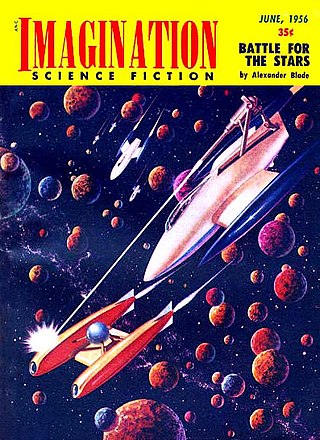
Galaxy Quest is a 1999 American science fiction comedy film directed by Dean Parisot and written by David Howard and Robert Gordon. A parody of and homage to science-fiction films and series, especially Star Trek and its fandom, the film depicts the cast of a fictional cult television series, Galaxy Quest, who are drawn into a real interstellar conflict by actual aliens who think the series is an accurate documentary. It stars Tim Allen, Sigourney Weaver, Alan Rickman, Tony Shalhoub, Sam Rockwell, and Daryl Mitchell. The film was a modest box office success and positively received by critics: It won the Hugo Award for Best Dramatic Presentation and the Nebula Award for Best Script. It was also nominated for 10 Saturn Awards, including Best Science Fiction Film and Best Director for Parisot, Best Actress for Weaver, and Best Supporting Actor for Rickman, with Allen winning Best Actor.

Leigh Douglass Brackett was an American science fiction writer known as "the Queen of Space Opera." She was also a screenwriter, known for The Big Sleep (1946), Rio Bravo (1959), and The Long Goodbye (1973). She worked on an early draft of The Empire Strikes Back (1980), elements of which remained in the film; she died before it went into production. In 1956, her book The Long Tomorrow made her the first woman ever shortlisted for the Hugo Award for Best Novel, and, along with C. L. Moore, one of the first two women ever nominated for a Hugo Award. In 2020, she posthumously won a Retro Hugo for her novel The Nemesis From Terra, originally published as "Shadow Over Mars".

Alien invasion or space invasion is a common feature in science fiction stories and film, in which extraterrestrial lifeforms invade the Earth to exterminate and supplant human life, enslave it, harvest people for food, steal the planet's resources, or destroy the planet altogether. It can be considered as a science-fiction subgenre of the invasion literature, expanded by H. G. Wells's seminal alien invasion novel The War of the Worlds.

Drexel Jerome Lewis Bixby was an American short story writer and scriptwriter. He wrote the 1953 story "It's a Good Life", which was included in The Science Fiction Hall of Fame. It formed the basis of a 1961 episode of The Twilight Zone and was remade in Twilight Zone: The Movie (1983). He wrote four episodes for the Star Trek series: "Mirror, Mirror", "Day of the Dove", "Requiem for Methuselah", and "By Any Other Name". With Otto Klement, he co-wrote the story upon which the science fiction movie Fantastic Voyage (1966), the related television series, and the related Isaac Asimov novel were based. Bixby's final produced or published work so far was the screenplay for the 2007 science fiction film The Man from Earth.
"Zero Hour" is the twenty-fourth and final episode of the third season of the American science fiction television series Star Trek: Enterprise; the seventy-seventh episode overall. It first aired on May 26, 2004, on the UPN network within the United States. Set in the 22nd century, the series follows the adventures of the first Starfleet starship, Enterprise, registration NX-01. Season three of Enterprise features an ongoing story following an attack on Earth by previously unknown aliens called the Xindi.
"Extinction" is the 55th episode of the American science fiction television series Star Trek: Enterprise, the third episode of season three. It first aired on September 24, 2003 on the UPN network in the United States. This was the first episode to include the prefix "Star Trek" in the title of the series. Set in the 22nd century just prior to the formation of the United Federation of Planets, the series follows the adventures of Starfleet's first Warp 5 starship, Enterprise, registration NX-01.
Xenoarchaeology, a branch of xenology dealing with extraterrestrial cultures, is a hypothetical form of archaeology that exists mainly in works of science fiction. The field is concerned with the study of the material remains to reconstruct and interpret past life-ways of alien civilizations. Xenoarchaeology is not currently practiced by mainstream archaeologists due to the current lack of any material for the discipline to study.
U.S. television science fiction is a popular genre of television in the United States that has produced many of the best-known and most popular science fiction shows in the world. Most famous of all, and one of the most influential science-fiction series in history, is the iconic Star Trek and its various spin-off shows, which comprise the Star Trek franchise. Other hugely influential programs have included the 1960s anthology series The Twilight Zone, the internationally successful The X-Files, and a wide variety of television movies and continuing series for more than half a century.

Planetary romance is a subgenre of science fiction in which the bulk of the action consists of adventures on one or more exotic alien planets, characterized by distinctive physical and cultural backgrounds. Some planetary romances take place against the background of a future culture where travel between worlds by spaceship is commonplace; others, particularly the earliest examples of the genre, do not, and invoke flying carpets, astral projection, or other methods of getting between planets. In either case, it is the planetside adventures which are the focus of the story, not the mode of travel.

Edwin Charles Tubb was a British writer of science fiction, fantasy and western novels. The author of over 140 novels and 230 short stories and novellas, Tubb is best known for The Dumarest Saga, an epic science-fiction saga set in the far future. Michael Moorcock wrote, "His reputation for fast-moving and colourful SF writing is unmatched by anyone in Britain."

Many works of fiction have featured UFOs. In most cases, as the fictional story progresses, the Earth is being invaded by hostile alien forces from outer space, usually from Mars, as depicted in early science fiction, or the people are being destroyed by alien forces, as depicted in the film Independence Day. Some fictional UFO encounters may be based on real UFO reports, such as Night Skies. Night Skies is based on the 1997 Phoenix UFO Incident.
A flag of Mars is a concept of a possible flag design, meant to symbolize the planet Mars or to represent a fictional Martian government, in works of fiction.
Judith and Garfield Reeves-Stevens are a New York Times-bestselling husband-and-wife writing/producing team. In June, 2013, at the Constellation Awards ceremony in Toronto, the writing couple were honored with the Constellation Award for "Outstanding Canadian Contribution to Science Fiction Film or Television" for their role in creating the series, Primeval: New World.

Space opera is a subgenre of science fiction that emphasizes space warfare, with use of melodramatic, risk-taking space adventures, relationships, and chivalric romance. Set mainly or entirely in outer space, it features technological and social advancements in faster-than-light travel, futuristic weapons, and sophisticated technology, on a backdrop of galactic empires and interstellar wars with fictional aliens, often in fictional galaxies. The term does not refer to opera music, but instead originally referred to the melodrama, scope, and formulaicness of operas, much as used in "horse opera", a 1930s phrase for a clichéd and formulaic Western film, and "soap opera", a melodramatic television series. Space operas emerged in the 1930s and continue to be produced in literature, film, comics, television, video games and board games.
The Expanse is a series of science fiction novels by James S. A. Corey, the joint pen name of authors Daniel Abraham and Ty Franck. The first novel, Leviathan Wakes, was nominated for the Hugo Award for Best Novel in 2012. The complete series was nominated for the Hugo Award for Best Series in 2017. It later won, following its second nomination for the same award in 2020.

The Saturn Awards are American awards presented annually by the Academy of Science Fiction, Fantasy and Horror Films. The awards were created to honor science fiction, fantasy, and horror in film, but have since grown to reward other films belonging to genre fiction, as well as television and home media releases. The Saturn Awards were created in 1973 and were originally referred to as Golden Scrolls.
The year 2016 is marked, in science fiction, by the following events.
In 2018, the following events occurred in science fiction.










